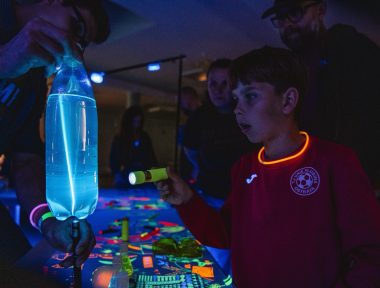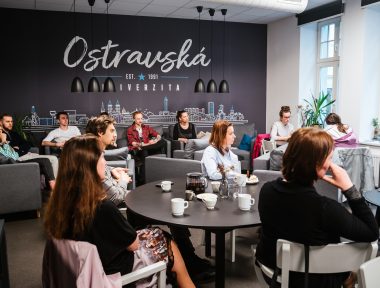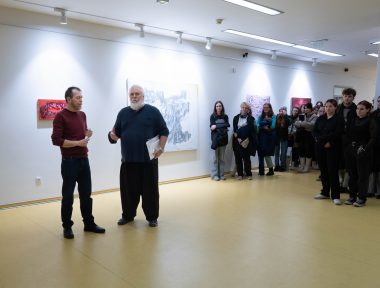The position of Security Manager is a new addition at the University of Ostrava—this step reflects the growing need to systematically address the protection of the academic environment. In an interview with Security Manager Adam Suchánek, you’ll learn what this role entails, what measures he’s planning to introduce to ensure a safe environment, and what kind of suggestions or concerns can students and staff approach him with.

This article is also available in Czech: „Mým cílem je nastavit opatření, na která se dá spolehnout,“ říká nový bezpečnostní manažer univerzity
Také čtěte
The role of Security Manager is new at the university. What are your expectations and plans for this position?
My goal is to establish rules and measures that make security at the university more than just a phrase—measures that truly work in practice and create an environment where everyone feels safe and knows they can rely on the implemented procedures. While certain threats and incidents can never be completely eliminated, I will do everything I can to ensure we are prepared for them and can respond effectively.
Is this type of position common at universities or other public institutions?
The position of Security Manager is not yet common at universities, but its importance is rapidly increasing. Given the growing security challenges—whether they involve physical threats, crisis situations, or the need for systematic risk management—more and more institutions are realizing that security is an integral part of their operations. Some public institutions, especially those with a large number of employees or specific operational needs, have already introduced similar roles.
Universities are gradually following this trend, as academic environment is now viewed as so-called “soft target” that deserves an adequate level of protection. I believe this role has a firm place at the university and can significantly contribute to a safer and better-prepared environment for everyone.
What will your job entail? What will you focus on the most?
My task is to coordinate all activities related to security incidents within the University of Ostrava and to systematically develop the university’s security strategy across its faculties and departments. I also plan to prepare guidelines that will help improve understanding of safety procedures. In addition, I want to contribute to the physical security of university buildings.
In the past, the university organized workshops focused on safety in public spaces. Are you considering following up on this activity? Are you planning any other types of training?
Yes, part of my role will include organizing regular training sessions focused on prevention and crisis situations so that both students and staff know how to respond appropriately in case of danger.
We are currently conducting security inspections of university buildings to identify potential weaknesses in physical security.
Since your arrival, have you noticed any major security gaps at the university?
At first glance, it might not seem like the university faces any major security risks—the environment appears calm and well-organized. However, that’s precisely why it’s important to pay attention to less obvious threats that may not be immediately visible. We are currently conducting security inspections of university buildings to identify potential weaknesses in physical security.
These inspections help uncover, for example, inadequately secured entrances, missing technical measures, or poorly placed security features such as cameras or lighting. The analysis results serve as a basis not only for proposing specific measures to enhance building security but also for preparing emergency response plans that allow for effective action during crisis situations.
A security drill recently took place at the City Campus focusing on handling an active shooter scenario. What is the main purpose of such drills, and are any more planned?
The main purpose of these drills is to test the readiness of the university and the integrated rescue system to respond to crisis situations such as an active shooter attack. The drills serve to practically test crisis scenarios, improve coordination between the police, emergency services, and the university, and also raise security awareness among students and staff. An important part of this process is also verifying the effectiveness of communication channels and safety measures in real-life conditions.
We plan to conduct additional drills in various university buildings in the future. These drills won’t be as large as the one at the City Campus, but they will be specifically targeted at different types of incidents—such as fire evacuation, suspicious object discovery, or handling situations involving aggressive behavior. The goal is to systematically strengthen the security culture and preparedness across the entire university.
What kind of issues can students or staff come to you with? When is it appropriate to contact you?
Students and staff are welcome to contact me at any time if they have any questions, suggestions, or concerns related to safety. I am open to addressing problems in a responsive and approachable way, and I believe that every feedback matters—whether it’s about physical security, suspicious behavior, technical measures, or just a feeling that something isn’t right.
It doesn’t have to be a serious incident—often, timely reporting of seemingly minor issues can help prevent bigger problems. I’m confident that we can always find the right solution together.
You have previously, for many years, worked for the Police of the Czech Republic. Which experiences from your past job do you think will be most useful at the university?
In the past, I worked as an investigator of serious violent crimes and also served as the head of the criminal police and investigation service. This gave me an extensive experience in organizing security measures, assessing safety risks, and managing crisis situations.
I have also extensive experience in communicating with public administration bodies, that can be valuable partners in the university’s security efforts. These experiences enable me to work effectively with external institutions and apply proven security practices to the university environment. I believe that this combination of practical knowledge and collaboration skills will be beneficial in ensuring a safe and prepared academic setting.
Would you like to share any message with students and staff? What can they do to help themselves feel safe at the university?
I’d like to remind everyone of the importance of being aware of what’s happening around them. Being observant of individuals who might be in university buildings without authorization or noticing unusual situations can contribute to ensuring that everyone feels safe and confident that the university remains a secure place for all.


 5 min.
5 min. 


